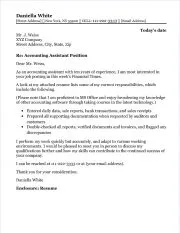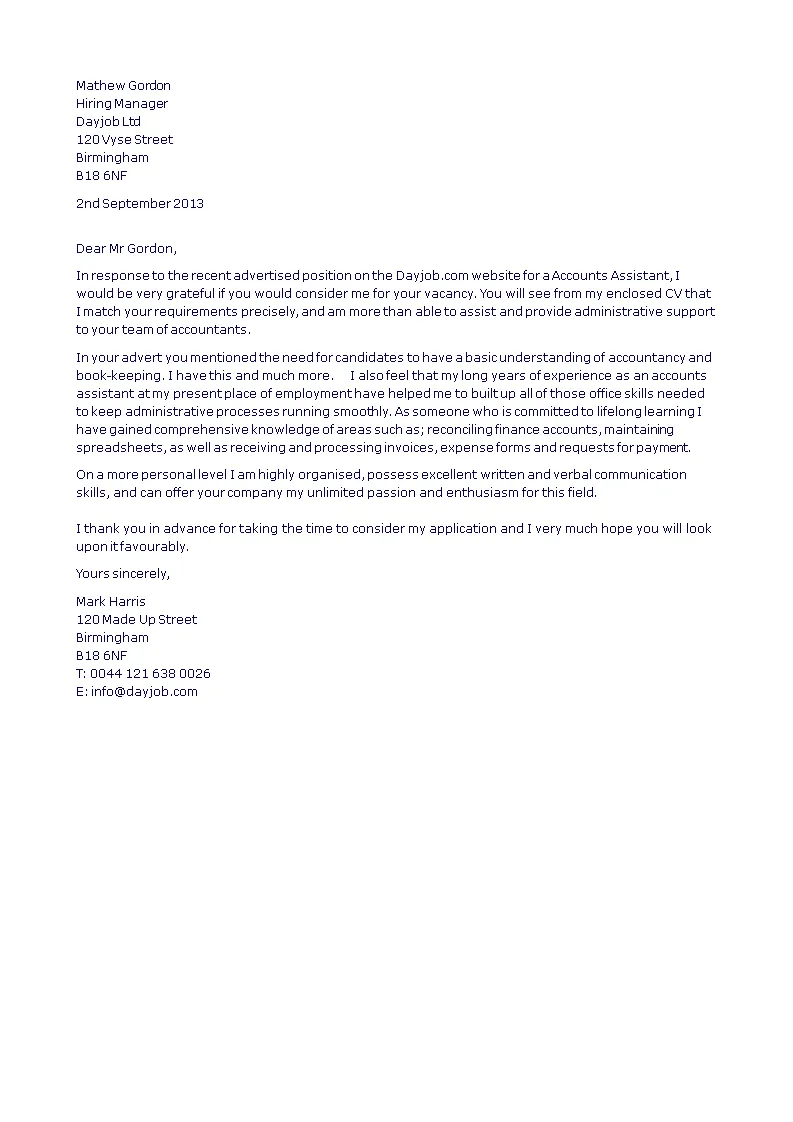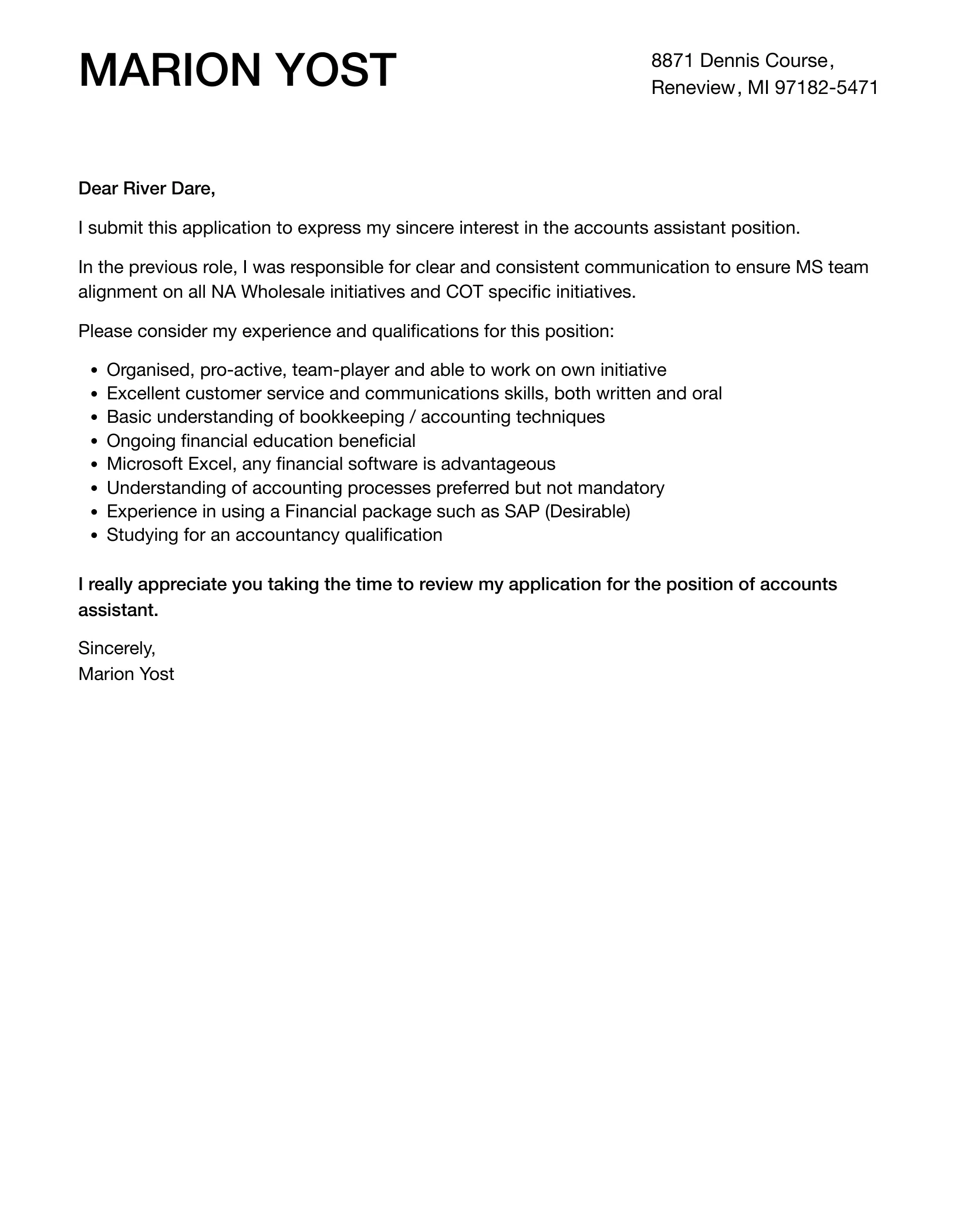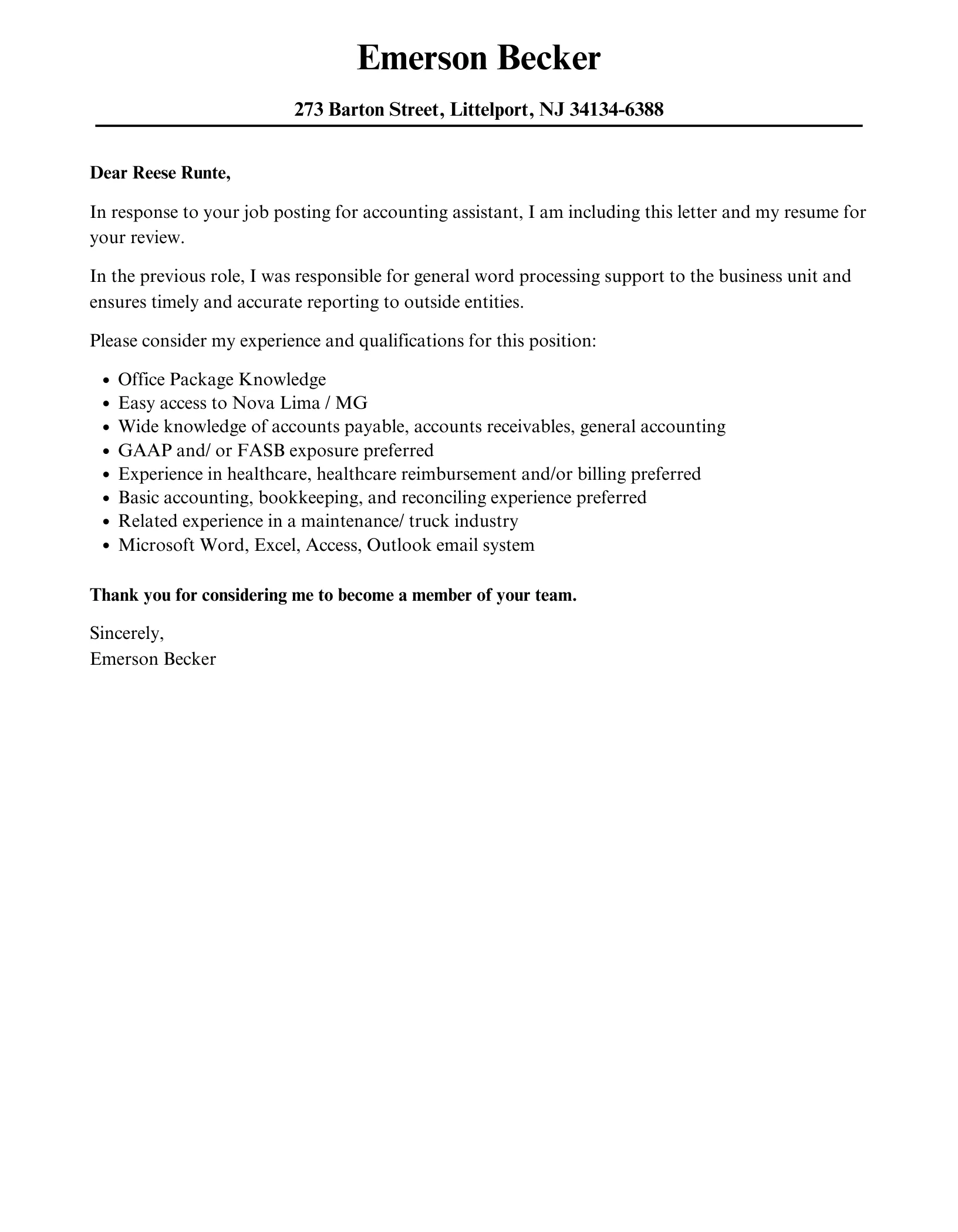Why a Great Accounting Assistant Cover Letter Matters
In the competitive field of accounting, a well-crafted cover letter is your first chance to make a positive impression on potential employers. It’s more than just a formality; it’s a crucial tool that can significantly influence your chances of landing an interview. Think of your cover letter as a personal introduction, allowing you to showcase your personality, enthusiasm, and how your skills align with the specific requirements of the job. A strong cover letter highlights your key qualifications, demonstrates your understanding of the company’s needs, and provides context to your resume. Without a compelling cover letter, your resume might get overlooked, even if you possess the necessary qualifications. It’s your opportunity to stand out from the crowd and persuade the hiring manager that you’re the ideal candidate for the Accounting Assistant position. A well-written cover letter is your initial marketing tool, making it an essential part of your job application package.
Key Components of an Accounting Assistant Cover Letter
Creating an effective cover letter requires attention to several key components. Each section plays a vital role in presenting a complete picture of your capabilities and suitability for the role. The structure should flow logically, drawing the reader in and highlighting your strengths. This includes clear contact information, a professional greeting, a compelling introduction, a body that showcases your skills and experience, and a strong conclusion. Remember to tailor each component to the specific job you are applying for, ensuring that your letter directly addresses the requirements outlined in the job description. By focusing on these key areas, you can create a cover letter that grabs attention and makes a lasting impression on the hiring manager. Always review your cover letter to ensure a professional tone and style that reflects your attention to detail, a critical trait for an accounting assistant.
Contact Information & Professional Greeting

Begin your cover letter with your full name, address, phone number, and professional email address. This information should be clearly displayed at the top of the letter. Following your contact details, address the hiring manager by name if possible, which demonstrates initiative and attention to detail. If you are unable to find the name, using a professional greeting like ‘Dear Hiring Manager’ is acceptable. Avoid generic greetings like ‘To Whom It May Concern’. Personalizing your greeting shows that you’ve taken the time to research the company and the specific role. This demonstrates professionalism and makes your cover letter more engaging. Ensure your email address is professional and appropriate; avoid using nicknames or informal addresses. This initial section sets the tone for the rest of your letter, so make sure it reflects professionalism and respect.
Highlighting Your Skills & Experience
The main body of your cover letter is where you showcase your relevant skills and experience. Tailor this section to match the job description. Identify the key skills and qualifications the employer is seeking and provide specific examples of how you have demonstrated these skills in previous roles. Use action verbs to describe your accomplishments and responsibilities. Instead of simply listing your duties, explain the impact of your contributions. For example, instead of saying, ‘Processed invoices,’ you might say, ‘Managed the processing of over 500 invoices monthly, ensuring accuracy and timely payments, which improved vendor relations.’ Quantify your achievements whenever possible, using numbers to demonstrate your impact. Highlight any specific software or systems you are proficient in, such as QuickBooks, SAP, or Microsoft Excel. This section is your opportunity to convince the hiring manager that you possess the skills required to excel as an Accounting Assistant. Show how your past experiences have prepared you for the demands of the role.
Showcasing Relevant Qualifications
Beyond your skills and experience, it’s vital to highlight relevant qualifications that support your application. This includes any certifications, degrees, or specialized training you’ve completed. Accounting Assistant roles often require specific educational backgrounds or professional certifications, such as an Associate’s or Bachelor’s degree in Accounting, or certifications like Certified Bookkeeper (CB) or Certified Public Accountant (CPA). Clearly state these qualifications, and when you obtained them. If you’re a recent graduate or have limited experience, focus on internships, relevant coursework, or projects that have provided you with practical experience. Emphasize any transferable skills you have, such as attention to detail, organizational skills, and problem-solving abilities. This section serves to validate your credentials and assure the hiring manager that you meet the minimum requirements for the position. Make sure to align your qualifications with the specific needs outlined in the job posting to maximize your impact.
Quantifying Achievements & Results

One of the most effective ways to make your cover letter stand out is by quantifying your achievements and results. Numbers provide concrete evidence of your accomplishments, making your claims more credible and impactful. Instead of saying, ‘Improved efficiency,’ state, ‘Increased invoice processing efficiency by 15%.’ Instead of ‘Managed accounts payable,’ say, ‘Managed accounts payable for a department with an annual budget of $2 million.’ Use specific metrics to showcase your impact. This could include the number of transactions processed, the amount of money saved, the percentage of error reduction, or the number of accounts reconciled. By quantifying your achievements, you demonstrate that you are results-oriented and that you can deliver tangible value to the organization. Make sure these figures are accurate and that they highlight your skills and the results you’ve obtained in previous roles. This approach can significantly enhance your cover letter and show the hiring manager the value you can bring to the company.
Demonstrating Enthusiasm & Fit
Expressing enthusiasm for the role and the company is a crucial element of a successful cover letter. This demonstrates your genuine interest and motivation, which can make a significant impression on the hiring manager. In the body of your letter, show your understanding of the company’s mission, values, and goals. Research the company and mention specific aspects that resonate with you. This could include their culture, their products or services, or their contributions to the community. Explain why you are excited about the specific opportunity, and what skills or experiences make you a good fit. Show, don’t just tell. Provide specific examples of how your values align with the company’s. Conclude with a strong statement of your desire to contribute to the company’s success. This enthusiastic approach will leave a memorable impression and make you appear more personable and relatable, increasing your chances of securing an interview.
Customizing Your Cover Letter for Each Job
One of the biggest mistakes job seekers make is using a generic cover letter for every application. Tailoring your cover letter to each specific job is essential. Begin by carefully reviewing the job description and identifying the key requirements and qualifications. Then, customize your letter to directly address these requirements. Highlight the skills, experiences, and qualifications that are most relevant to the position. Use keywords from the job description throughout your letter. Research the company to learn more about its culture, values, and recent achievements. Mentioning specific details about the company demonstrates that you’ve done your homework and that you are genuinely interested in the role. While a template can be a helpful starting point, always adapt it to fit the unique needs of each job. By customizing your cover letter, you demonstrate your attention to detail and your genuine interest in the position, increasing your chances of being selected for an interview.
Tailoring to Company Culture

Understanding and tailoring your cover letter to the company’s culture is an important strategy. Research the company’s values, mission, and work environment to gauge their culture. This can often be found on their website, social media, or through reviews. Consider the tone of your letter. Should it be formal, or a bit more relaxed? The language you use and the way you describe your experience should align with what you’ve learned about the company’s culture. If the company emphasizes teamwork, highlight your collaborative experiences. If they value innovation, showcase your proactive approach to problem-solving. The goal is to show the hiring manager that you’re not only qualified but also that you would be a good fit for their team. This will help the hiring manager envision you in the role, and make you appear more personable and aligned with the company’s vision. This demonstrates you have taken the time to understand their culture and can integrate into their environment.
Proofreading and Formatting Tips
Before you submit your cover letter, it’s vital to proofread it carefully. Errors in grammar, spelling, or punctuation can create a negative impression, undermining your credibility. Use a grammar checker and spell-check, but also read the letter multiple times to catch any mistakes that automated tools might miss. Consider having a friend or colleague review your letter as a second set of eyes can often catch errors you might have missed. Pay attention to formatting. Use a professional font, and ensure the text is easy to read. Keep the letter concise and focused, typically one page is the ideal length. Use clear headings and bullet points to improve readability. Use consistent spacing and alignment throughout the document. Make sure the layout is clean and well-organized. Your cover letter should be as polished and professional as possible. A well-formatted and error-free cover letter shows your attention to detail, which is a critical skill for an accounting assistant.
Conclusion
Creating a compelling cover letter is an essential part of any job application process for an Accounting Assistant role. By following the tips and strategies outlined in this guide, you can significantly improve your chances of capturing the hiring manager’s attention. Remember to tailor your letter to each specific job, highlighting your skills, experience, and qualifications in a way that directly addresses the needs of the position. Express enthusiasm for the role and the company, showcasing your genuine interest and motivation. Proofread your letter meticulously to ensure it is free of errors and well-formatted. A well-written cover letter not only highlights your qualifications but also demonstrates your professionalism and attention to detail. By investing the time and effort into crafting a compelling cover letter, you are taking a significant step toward landing your dream job in accounting.
